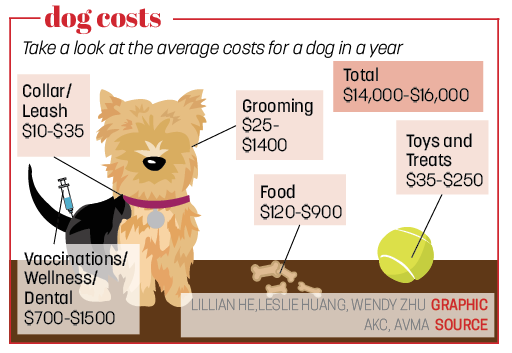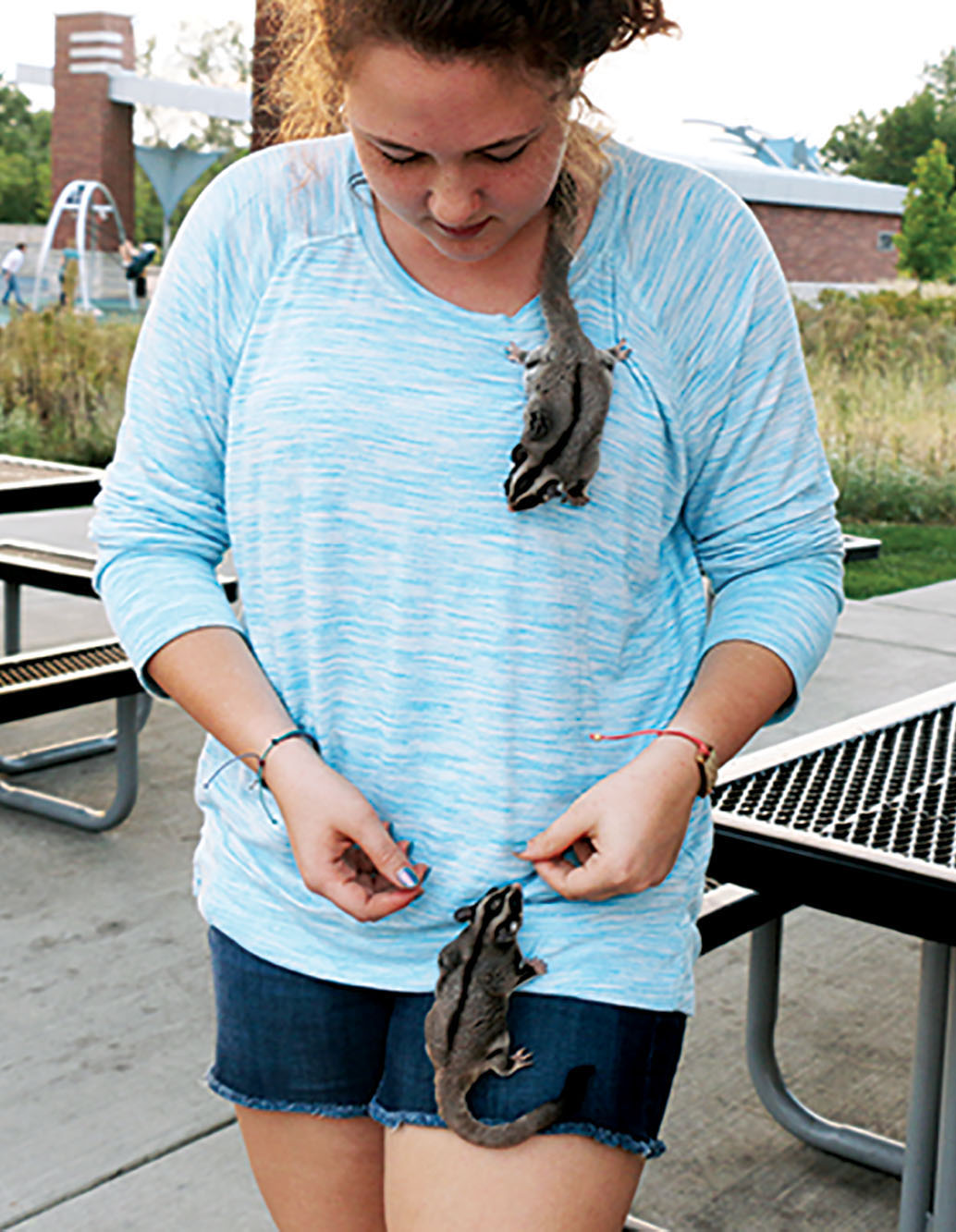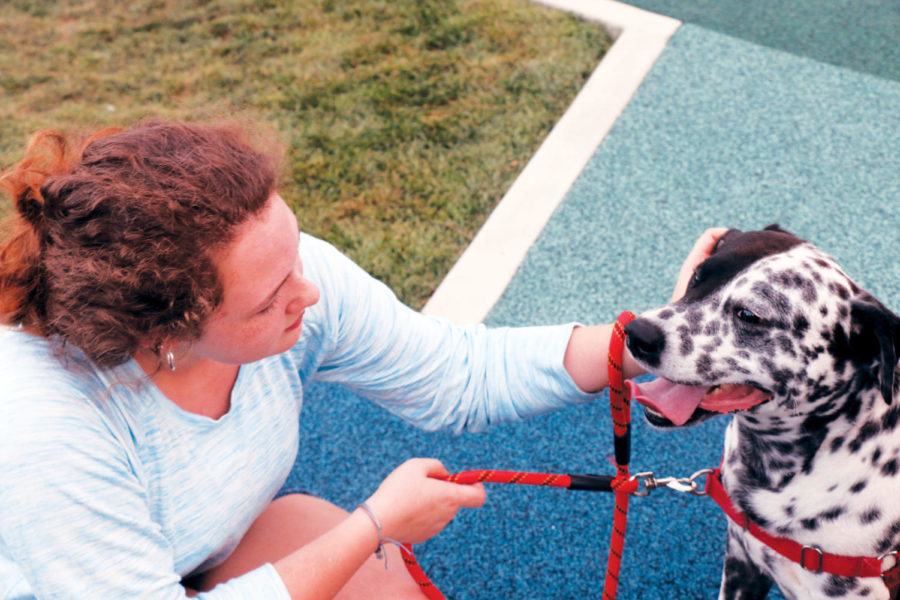Since 1981, the American Humane Society has designated October as Adopt-A-Dog month. However, adopting a dog—or any pet, for that matter—comes with a whole plethora of its own responsibilities. Junior Alania Mastain, whose family owns a dog, three sugar gliders and two guinea pigs, is no stranger to the obligations that come with raising a pet.
“We just took my dog in last month to get a checkup. He’s doing okay, and my dog has all of his required vaccinations,” Mastain said. “(My sugar gliders) are actually going in next month to get their checkup. As for other responsibilities, cleaning is probably the biggest one. Sugar gliders are extremely, extremely messy, so you can’t be scared to get your hands dirty.”
 According to Elizabeth Morrison, medical director of VCA Companion Animal Medical Center, non-pet-owners can sometimes be quite unaware of all the responsibilities that come with a pet.
According to Elizabeth Morrison, medical director of VCA Companion Animal Medical Center, non-pet-owners can sometimes be quite unaware of all the responsibilities that come with a pet.
“There’s a lot of responsibilities. Vaccinations are definitely one of them,” Morrison said. “(Spaying) and (neutering) and controlling the pet population is another really important thing that new pet owners need to realize needs to be done with their pet… dentistry is also another very, very important thing.”
Morrison added that VCA Companion Animal Hospital actually offers many of the same services as a hospital for humans would, simply because pets do have many of the same health needs as humans—such as the aforementioned oral hygiene.
In fact, one of the main reasons that senior Amee Punater said she does not currently own a dog is simply because of the amount of responsibility that comes with raising a pet, which Morrison said can be comparable to raising a human child.
“I’ve always wanted a pet, especially a dog. I don’t have them because my parents think it’s a huge responsibility,” Punater said. “It’s almost like having a kid. You have to be able to feed it. You have to know its sleeping time. You have to be able to take care of it. To go out of town, you have to have someone take care of it, and you just have to make sure you know where it is because it is basically a kid.”
Because of the significant emotional and time commitment that can come with raising certain pets, Morrison said it is very important to choose a pet that best fits both your lifestyle and its lifestyle. This is where prior research into the specific pet’s habits can play a significant role.
“I feel like the most important thing is just remembering that (pets) are your responsibility and that you’ve got to make time to go back and let them out or make sure that they’re cared for if you decide to go out of town,” Morrison said. “Make sure that you’re picking a breed or a pet that can easily be transported with you from one living place to another without a lot of stress on the animal.”
Mastain said sugar gliders are nocturnal, which she said fits into her schedule of being a student quite smoothly. Yet unlike Mastain, Punater said her parents did not find their family’s lifestyle to be compatible with raising pets, from busy schedules to specific diets.

Junior Alania Mastain feeds her two sugar gliders, Koda and Loki. Sugar gliders are small nocturnal marsupials that are native to Australia. They get their name from the sweet nectar that they like to eat and how they glide from tree to tree.. Mastain said she easily spent 1,000 dollars on them in less than a year, but that they’re worth it.
“I have a sister who is an eighth-grader and we just are so consumed in our own lives that it would be hard to take care of a pet. (My parents) also work so they don’t have much time,” Punater said. “Different types of (dog) breeds require different types of diets and they can be really restrictive. So, it becomes really hard once you have a pet to figure out what type of diet they are and (to understand) regular cycles of their day that aren’t the same as humans.”
Outside of the numerous responsibilities pets bring, they do offer numerous benefits as well. For one, both Morrison and Mastain discussed how pets can be a source of emotional growth and maturity.
“(There are) really strong studies out there that (show) having companionship that is just non-restrictive compassion you’re pouring out to an animal (is) very good mentally,” Morrison said. “A lot of pets are used as therapy dogs, not only just for companion animals, but also going into schools, being read to, going into nursing homes, for people that are wheelchair-bound and those types of things. (Pets) are very, very beneficial mentally.”
Mastain added that she has matured a lot and felt a sense of accomplishment from being able to completely take care of her sugar gliders. She said she had to research in-depth before buying the sugar gliders, pay for all of their expenses—from food to checkups—and find time to spend with them on a daily basis.
“It’s a big responsibility, but I think (owning pets) helped me mature and grow a lot,” Mastain said. “It’s made me almost feel like a mom taking care of her child because it’s a lot of responsibility. You’ve gotta be on it as soon as you get home until you go to bed at night. But they’re so adorable and fuzzy and they’re so sweet, and it’s totally worth it. It’s like an overwhelming feeling of accomplishment.”
In the end, Morrison emphasized the amount of responsibility of pets and encouraged for prospective pet owners to properly research for a pet that has a compatible lifestyle, while she also called for current pet owners to stay on top of necessary pet responsibilities.
“I think it’s great that people are realizing that pets are a lifelong responsibility for them, and that it’s not just necessarily a knee-jerk decision,” Morrison said. “There’s so much joy that they bring, but they are a lot of work as well. Physically as well as economically, there’s definitely things to consider before you take that plunge. I think we do a great job in our community with being pet-friendly and taking really good care of our animals, so I think (prospective pet owners) have a really great example set for them. It’s just up (to) everybody to continue on with that and be responsible with their pets.”































![What happened to theater etiquette? [opinion]](https://hilite.org/wp-content/uploads/2025/04/Entertainment-Perspective-Cover-1200x471.jpg)














































![Review: “The Immortal Soul Salvage Yard:” A criminally underrated poetry collection [MUSE]](https://hilite.org/wp-content/uploads/2025/03/71cju6TvqmL._AC_UF10001000_QL80_.jpg)
![Review: "Dog Man" is Unapologetically Chaotic [MUSE]](https://hilite.org/wp-content/uploads/2025/03/dogman-1200x700.jpg)
![Review: "Ne Zha 2": The WeChat family reunion I didn’t know I needed [MUSE]](https://hilite.org/wp-content/uploads/2025/03/unnamed-4.png)
![Review in Print: Maripaz Villar brings a delightfully unique style to the world of WEBTOON [MUSE]](https://hilite.org/wp-content/uploads/2023/12/maripazcover-1200x960.jpg)
![Review: “The Sword of Kaigen” is a masterpiece [MUSE]](https://hilite.org/wp-content/uploads/2023/11/Screenshot-2023-11-26-201051.png)
![Review: Gateron Oil Kings, great linear switches, okay price [MUSE]](https://hilite.org/wp-content/uploads/2023/11/Screenshot-2023-11-26-200553.png)
![Review: “A Haunting in Venice” is a significant improvement from other Agatha Christie adaptations [MUSE]](https://hilite.org/wp-content/uploads/2023/11/e7ee2938a6d422669771bce6d8088521.jpg)
![Review: A Thanksgiving story from elementary school, still just as interesting [MUSE]](https://hilite.org/wp-content/uploads/2023/11/Screenshot-2023-11-26-195514-987x1200.png)
![Review: "When I Fly Towards You", cute, uplifting youth drama [MUSE]](https://hilite.org/wp-content/uploads/2023/09/When-I-Fly-Towards-You-Chinese-drama.png)
![Postcards from Muse: Hawaii Travel Diary [MUSE]](https://hilite.org/wp-content/uploads/2023/09/My-project-1-1200x1200.jpg)
![Review: "Ladybug & Cat Noir: The Movie," departure from original show [MUSE]](https://hilite.org/wp-content/uploads/2023/09/Ladybug__Cat_Noir_-_The_Movie_poster.jpg)
![Review in Print: "Hidden Love" is the cute, uplifting drama everyone needs [MUSE]](https://hilite.org/wp-content/uploads/2023/09/hiddenlovecover-e1693597208225-1030x1200.png)
![Review in Print: "Heartstopper" is the heartwarming queer romance we all need [MUSE]](https://hilite.org/wp-content/uploads/2023/08/museheartstoppercover-1200x654.png)



